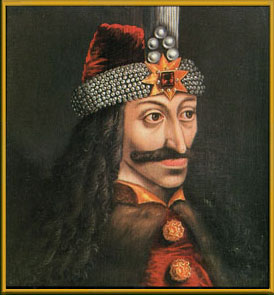
Although I haven't yet given much time to this page, I would like to include the following account of the atrocities committed by the historical Dracula ("devil"), known as Vlad Tsepesh, Voivod of Wallachia (1456-62, and again in 1476). Take note that these stories were originally penned in 1486, and copied in the year 1490 by the monkish chroniclers at Kirill-Belozersk, in northern Russia. In addition, similar narratives have been documented independently by a wide variety of respected, unbiased historians throughout Europe, leading to the inevitable conclusion that these exploits of Vlad "the Impaler" are indeed factual and unexaggerated. Even the Rumanian people, who to this day view the Draculas as a great and noble race, do not deny these acts of unparalleled violence.
Dracula's exploits form a rough cycle of twelve incidents--incidents which for preposterous and whimsical cruelty challenge comparison with the outrages of young Caligula--and in the oldest manuscripts they are presented in the following order: the Turkish ambassadors sent to Dracula's court in Wallachia failed to remove their fezzes in his presence. To Dracula's question about this impropriety, the emissaries replied that such was their custom. The witty governor had their fezzes nailed to their heads in order to "fix them in this observance."
Dracula offered to join forces with the Turkish sultan upon the condition that his army be granted immunity from attack. The sultan accepted. After marching his army five days into Turkish territory, Dracula wheeled his host toward home. On the return march his men ravaged the countryside and killed, impaled, or tortured all the land's inhabitants.
All offenders against Dracula's laws were put to death, whatever their offense. In his domain was a spring of cool, sweet water by which he placed a golden drinking cup. No one ever dared steal this, so great was the fear he aroused.
Once Dracula had the aged, sick and poor of his domain summoned. He invited his guests into a large, specially made apartment and there fed them and gave them wine. He then asked the assembled unfortunates if they wished to be freed from all earthly care. They answered that they did; whereupon Dracula burned the building down upon them.
Two Catholic monks from Hungary visited Dracula in order to beg alms. Dracula took each separately, showed him the numerous wretches impaled upon stakes in his courtyard and asked him whether he had acted rightly. The first monk said no; the second monk said that a ruler was appointed by God to execute the wicked and reward the righteous. Dracula had the first monk impaled; the second monk he gave fifty gold ducats and dismissed with honor.
A merchant who had 160 gold ducats stolen from a cart appealed to Dracula for justice. Dracula had a similar quantity of gold, with the addition of one extra ducat, replaced in the cart. The merchant reported to Dracula the restoration of his money, as well as the presence of the additional ducat, at the very moment the captured thief was brought in. Dracula let the merchant go, telling the latter that had he not reported the extra ducat, he would have impaled him along with the thief.
Dracula was particularly cruel to lazy and unchaste women, as exemplified by this story. Once he met a poor peasant wearing a torn shirt. The peasant was asked if he had a wife, and next, if he had flax. When he replied affirmatively, Dracula had the hands of the peasant's lazy wife cut off and then ordered her to be impaled.
A peasant attending Dracula while he dined among the corpses of his courtyard held his nose against the stench. Dracula had him impaled to elevate him above such annoying odors.
Dracula continually set traps in the form of subtle questions for foreign envoys. If they failed to elude these, he impaled them, saying that he was not responsible for the punishment, but their master, who chose unsuitable emissaries.
Dracula had workmen make him iron casks which he filled with gold and lowered into a river. Afterward he had the workmen killed so that his secret would not be known.
King Matthias of Hungary defeated Dracula and imprisoned him at Vyshegrad on the Danube for twelve years. Even in prison Dracula managed to act with customary cruelty. He caught mice and impaled them, bought birds and plucked them alive.
In return for embracing Catholicism, the king freed Dracula and restored him to his former eminence. Ten years later, after defeating the Turks in a battle, Dracula rode to the top of a hill in order to survey his victory and was mistakenly killed by one of his own men in the failing light.